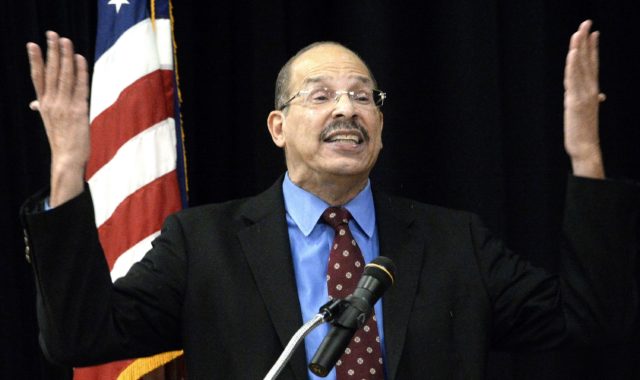Associated Press
Lawyer Donald Watkins Sr. was sentenced to five years in prison Tuesday after earlier being convicted of swindling NBA star Charles Barkley and using the name of former Secretary of State Condoleezza Rice to bolster an investment scam.
U.S. District Judge Karon O. Bowdre also ordered Watkins to pay about $14 million in restitution.
Prosecutors had sought a prison sentence of 17½ years for Watkins and 6½ years for his son, Donald Watkins Jr. Both were convicted on fraud and conspiracy charges earlier this year. The two men stole more than $15 million from investors and a bank, prosecutors said.
Bowdre said she took the elder man’s age, 70, into consideration in imposing a lighter sentence, but the term was stiffer than the home confinement requested by Watkins Sr.
The younger Watkins was sentenced later Tuesday to 27 months in prison.
During the pair’s trial earlier this year, witnesses including Barkley testified about losing money in an investment scheme run by the elder Watkins.
Barkley, who grew up near Birmingham and now works as a television analyst, described himself as a friend of the elder Watkins, who has split time living in both Alabama and Atlanta.
Barkley lost more than $6 million in investments and loans, prosecutors said, and so did other professional athletes including former NFL players Takeo Spikes and Bryan Thomas and former NBA star Damon Stoudamire.
Rice, a native of Birmingham, testified that Watkins Sr. wrongly used her name in promoting an energy business at the heart of the case. Prosecutors said Watkins included Rice’s name in an email to investors although she had declined to get involved.
Watkins Sr. once served as a city council member in Montgomery and helped successfully defend HealthSouth Corp. founder Richard Scrushy in a massive fraud that nearly bankrupted the company, now known as Encompass Health. He also has worked on civil rights cases.
More than 15 years ago, Watkins Sr. drew media attention when he attempted to purchase a major league baseball team. More recently he said he was attempting to purchase the NFL’s St. Louis Rams before the team moved to Los Angeles.
Although he portrayed himself as wealthy, prosecutors said Watkins Sr. had a net worth of only a few thousand dollars.
Writing in a blog post before the sentencing, Watkins Sr. said he would continue to appeal his conviction and claimed he was innocent.
“Jurors try to do the right thing, more often than not. However, my 46-years of active participation in the American judicial system has shown me (and the world) that well-meaning jurors often convict innocent defendants,” Watkins Sr. wrote.
Sending A Message
The father and son co-defendants were convicted on March 8, 2019, following a jury trial that lasted over two weeks. Watkins Sr. was convicted of seven counts of wire fraud, two counts of bank fraud and one count of conspiracy. Watkins Jr. was convicted of one count of wire fraud and one count of conspiracy.
“These defendants sought to enrich themselves through wire and bank fraud,” said U.S. Attorney Jay E. Town of the Northern District of Alabama. “The sentences give notice to the public that the Department of Justice stands ready with the resources to investigate and prosecute similar offenders.”
“Today’s sentence should send a message to those who would engage in financial fraud,” said Special Agent in Charge Johnnie Sharp Jr. of the FBI Birmingham Field Office. “We are pleased that the Watkins are being held accountable for their crimes and that they were ordered to pay restitution to the victims. The FBI will continue to work with our law enforcement partners to investigate and prosecute those who commit complex financial crimes.”
According to evidence presented at trial, between approximately 2007 and 2013, Watkins Sr. sold “economic participations” and promissory notes connected with Masada Resource Group, a company that he ran as manager and CEO. Investors paid more than $10 million dollars after Watkins Sr. and Watkins Jr. falsely represented that the money would be used to grow Masada, which Watkins Sr. described as a “pre-revenue” company that supposedly had technology that could convert garbage into ethanol.
Instead of investing the money into Masada, however, Watkins Sr. and Watkins Jr. diverted funds to pay personal bills and the debts of their other business ventures, the evidence showed. Victim money was used to pay for Watkins Sr.’s alimony, hundreds of thousands of dollars in back taxes, personal loan payments, a private jet and clothing purchased by Watkins Jr. and his wife.
Emails introduced at trial also showed that Watkins Sr. and Watkins Jr. planned to obtain millions of dollars for these purposes from one victim on multiple occasions, when they knew that this victim and other victims trusted them to put their money to use in growing Masada. The defendants’ scheme eventually grew to include another business venture, Nabirm Global, a company that Watkins Sr. claimed held mineral rights in Namibia.
Watkins Sr. also was convicted of defrauding Alamerica Bank, an entity in which Watkins Sr. held a controlling interest through his ownership of Alamerica Bank Corp stock, the evidence showed. In order to pay hundreds of thousands of dollars in litigation expenses associated with another one of Watkins Sr.’s business ventures, Watkins Sr. executed a plan to use a straw borrower to take out money from Alamerica Bank and use those funds to pay the defendant’s litigation expenses. This straw borrower—Watkins Sr.’s long-time mentor and a prominent figure in the Birmingham community, later identified as former mayor Richard Arrington Jr.—took over $900,000 in loans from Alamerica Bank and then immediately permitted Watkins Sr. to use those funds for his personal benefit, the evidence showed.
usdoj.gov contributed to this post





